The Ukrainian community in the United States played a decisive role in many events in Ukrainian history. It will just suffice to mention the fateful year 1991. Historian Serhii Plokhii proves in his book "The Last Empire: The Final Days of the Soviet Union" that the influence of the Ukrainian diaspora inclined the then U.S. President George W. Bush to acknowledge the results of the referendum on Ukraine's independence on December 1, 1991.
The decision did not seem obvious. Just four months before, the U.S. president spoke in the Verkhovna Rada and called on Ukrainians to cling to Moscow, not to proclaim independence, and to remember the threat of "suicidal nationalism." What changed during those four months? The evidence collected by Plokhii convinced Bush that he desperately needed the sympathy of a million representatives of the Ukrainian diaspora - traditional Republican supporters – in order to be re-elected in the presidential election in 1992.
In 1991, a young New Yorker from a famous and noble Ukrainian family, Andrij Dobriansky, only entered school in the East Side of Manhattan. His father, Andrij Vsevolod Dobriansky, was a well-known Ukrainian-American opera singer, a star of the Metropolitan Opera. The family spoke exclusively in Ukrainian.
The year 1991 gave hope that the Cold War was over, Ukraine became finally independent, and the struggle for survival, in which the community in America holds its share of the front, was no longer needed. Expectations have not proved true. In 23 years, historical trials will again affect the fate of Ukraine, and on that of Andrij.
During Russia's armed aggression against Ukraine, he became one of the most recognizable public figures representing Ukraine's position in the American and world media. As director for communications and representative of the largest organization of Ukrainian Americans, he calls on Ukrainian-born voters to register in the U.S. elections (the increase in the number of voters of a certain origin attracts the attention and commitment of future congressmen).
We meet in the premises of the Ukrainian Congress Committee of America (UCCA) in East Village, one of the prestigious neighborhoods of New York in the lower Manhattan. Sometimes it is also called the Ukrainian Village because of a great number of Ukrainians who have been living in this part of the city for at least a hundred years. In addition to the UCCA, the historic Ukrainian National Home, the Selfreliance Federal Credit Union, Plast, the Ukrainian Sports Club, Radio Domivka, the Veselka restaurant, as well as modern Ukrainian organizations such as Razom for Ukraine, are located here, on Second Avenue.
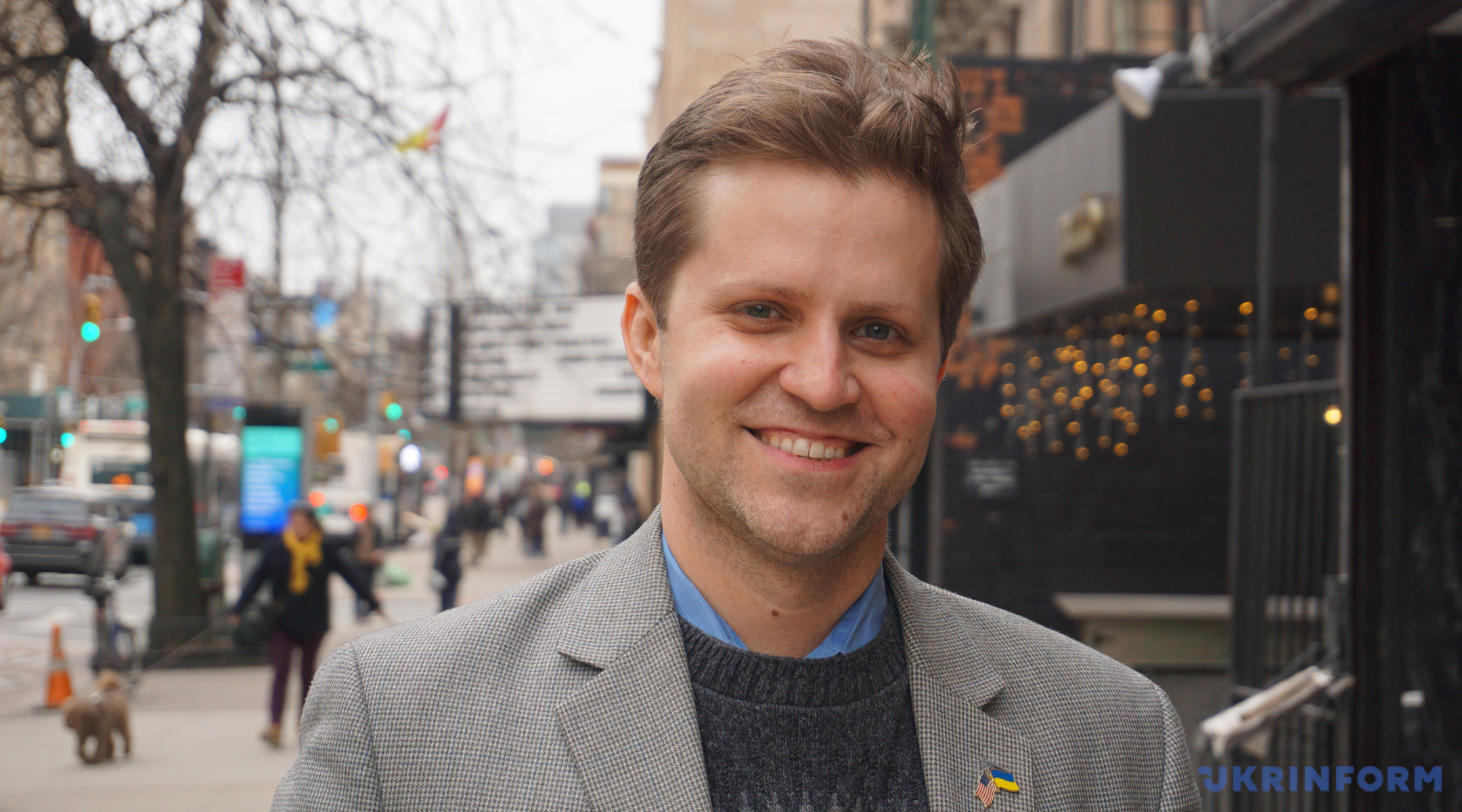
THE VOICE OF THE UKRAINIAN COMMUNITY
Question: The Ukrainian Congress Committee of America is a long operating and authoritative organization. However, I anticipate that not everyone in Ukraine is sufficiently aware of it. What exactly it is doing?
Answer: The most important goal of the committee is to have a permanent organization in America, a long operating one, as you correctly noted, so that year by year, decade by decade, the American government at the federal, state or local level could turn to a single Ukrainian body, which in turn will spread the information to others.
Our organization was founded in 1940. However, the United Ukrainian Organizations of America (UUOA) had also operated since 1922. Consequently, such a permanent representative office has existed for about a hundred years. In 1922, they called themselves "representatives" of Ukrainians in America.
The community does not incline unanimously in one direction or another. But in some cases, we are able to reach agreement and address the American authorities, the American press with one voice.
Since the very beginning, our composition has included large and numerous societies, for example, professional doctors or Ukrainian-American veterans. These are such unions are the Ukrainian National Association and the Providence Association of Ukrainian Catholics in America. All kinds of religious or professional, cultural, scientific organizations. We want all of them to be able to get together. The National Council meets biannually. The Congress of Ukrainians in America meets quadrennially . There, we can discuss what is going on in different parts of the country, how a community or cultural center lives there, and we can exchange ideas.
Q: How many organizations are currently members of the UCCA?
A: The UCCA currently consists of more than 20 regional organizations. Two more organizations joined last year, so in general, there are already 22. Our highest body, the National Council, includes heads of local districts. New York has its own organizations, and Ohio has its own. All of them can have their own local participants. The National Council also includes the heads of the largest Ukrainian religions in America, the Ukrainian Catholic Church, the Ukrainian Orthodox Church. We also cooperate with Baptists and Protestants. We have very close ties with Crimean Tatar unions in America.
Q: Which two organizations joined the UCCA last year?
A: The Center for U.S.-Ukrainian Relations in Washington joined as a scientific organization. We organize various conferences with them. And also one of our oldest organizations here in America is the Organization for the Rebirth of Ukraine. It was created in the 1930s after a visit by Colonel Konovalets. It is an old patriotic organization that still has, if I am not mistaken, six branches throughout America. They were not members of the committee for a long time. They were an independent organization, which was only part of the Ukrainian World Congress, but now they returned to the UCCA. Since the Maidan, more and more organizations are seeking to unite so that we can jointly address the president or the Congress with a common view on a number of issues.
Q: Are Crimean Tatars also members of the UCCA?
A: No, they do not have offices throughout America, but they have one large organization in Brooklyn. Almost all the Crimean Tatars who come to America arrive in the Christian Cultural Center in Brooklyn. There is also a mosque there. Every year I go together with them for Ramadan. Every year in May, we jointly mark the anniversary of the genocide of the Crimean Tatar people.
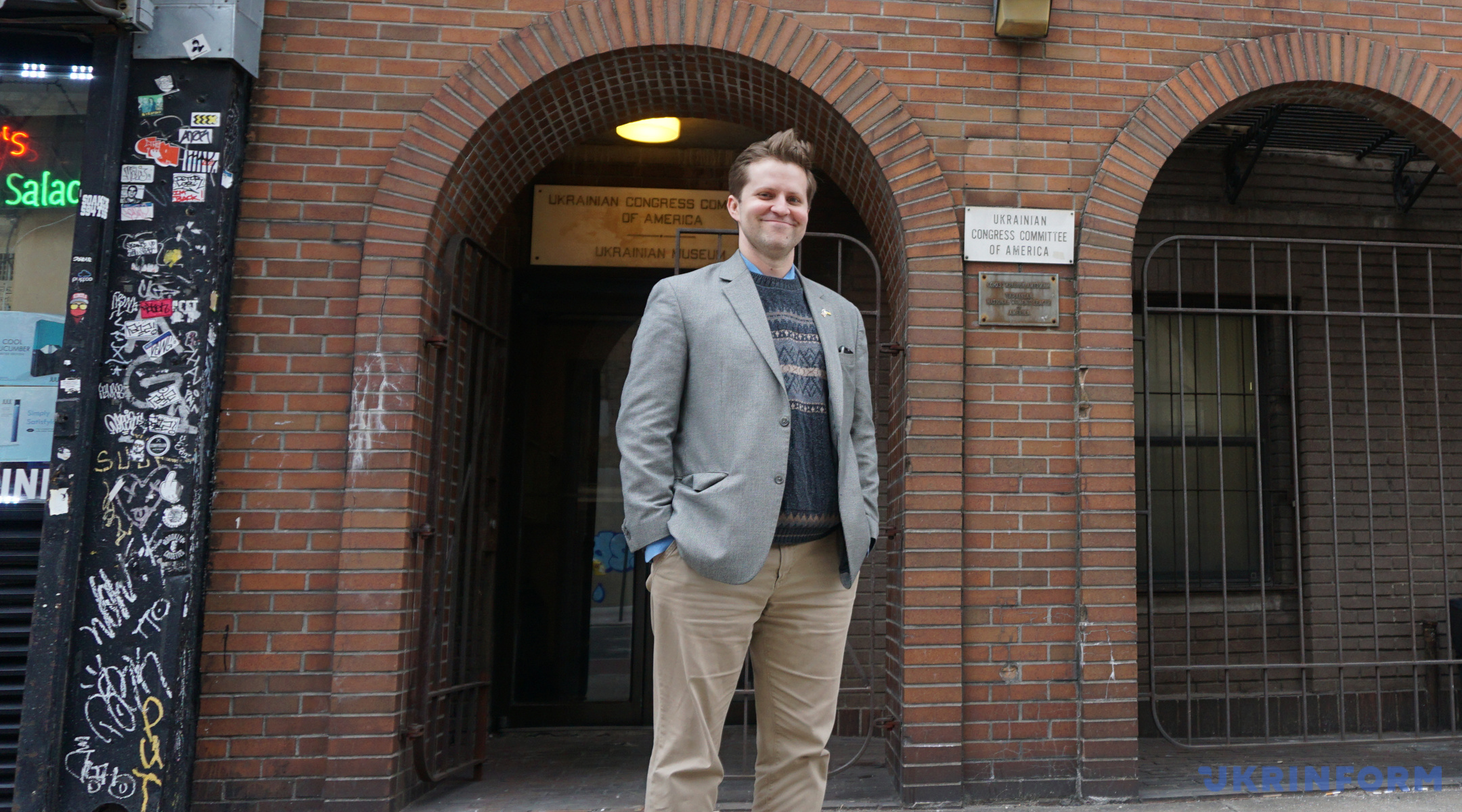
THE TIME OF THE GREATEST CHANGES IN THE U.S. CONGRESS
Q: The Congressional Ukrainian Caucus [a group of friendship with Ukraine] has recently elected a new co-chair. A new Republican senator joined a similar group in the upper chamber of the U.S. Congress. In terms of Ukraine's support, what are your expectations of the 116th Congress?
A: In general, now is the time of the greatest changes. For six years, from 2012 to 2018, there were not so many changes in the Congress as we see today. We still know who prepares bills in every committee. But apart from meetings with some congressmen, we have not yet had official visits. Or, for example, we did not meet with the foreign affairs committee, or with the armed services committee with which it is important for us to maintain good ties. They form a defense budget, which includes military assistance to Ukraine, which has been steadily increasing since 2014. America has already provided more than $1.5 billion to Ukraine, and we would not want the aid to be reduced now, as long as an open war is ongoing.
The work of the Congress has just begun. So far, issues of the defense budget or the financing of the State Department are not on the agenda.
There is a different approach to working with government agencies. As far as I know, some activists would like to have a revolution everyday, and they always call on people to take to the streets. But for those who represent their community day by day, it is sometimes better to have friends rather than significant changes in the composition of elected politicians.
Of course, we will appeal as much as possible to our old friends - Democrats or Republicans - for support, when the time comes, when the budget is adopted and we will see if money has disappeared there. Or certain words in support of Ukraine. Every bill passes many stages. From subcommittees to committees, then to the House of Representatives, and then to the Senate. Changes can be made at all levels.
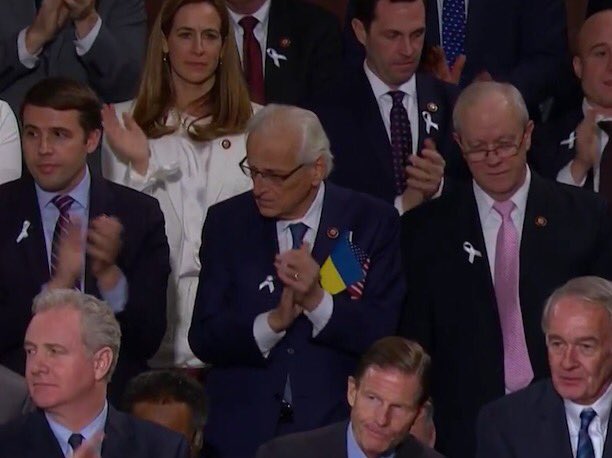
Q: Congressman Bill Pascrell, who listened to Donald Trump's speech with a Ukrainian flag in his hands, wore it on his own initiative or someone prompted him to do that?
A: Oh, no-no-no. This congressman knows everything - where our community is located, where our churches, cultural centers are located, and he visits us. His doors are always open when Ukrainians come to the Congress, for a meeting. He even not always expects our initiative. Sometimes Congressman Pascrell calls and says: "I have some ideas in Congress." He is a very good friend of Ukraine and of Ukrainians in America. It would be great to see more people of this kind. The more conversations we have with such congressmen as new members of the House of Representatives and new senators, the better. We are currently working on meetings with new elected parliamentarians. There is an instruction on our page how voters can meet with newly elected congressmen, because every two years, with every new Congress, again and again we need to work with the support group of Ukraine.
Q: Some people in Ukraine believe that the world is tired of Ukraine, everybody is tired of this "topic." Do you feel this sentiment here?
A: Oh no. Now there are just a lot of changes here, and there are many people who, first of all, do not know about Ukraine. They are not tired. They just need to be addressed, and this is what we are doing. Our support group grew most after 2014, to about 60 members. And we are able to add more members. I'm not afraid of fatigue, but I just worry about adding more and more members to our caucus.
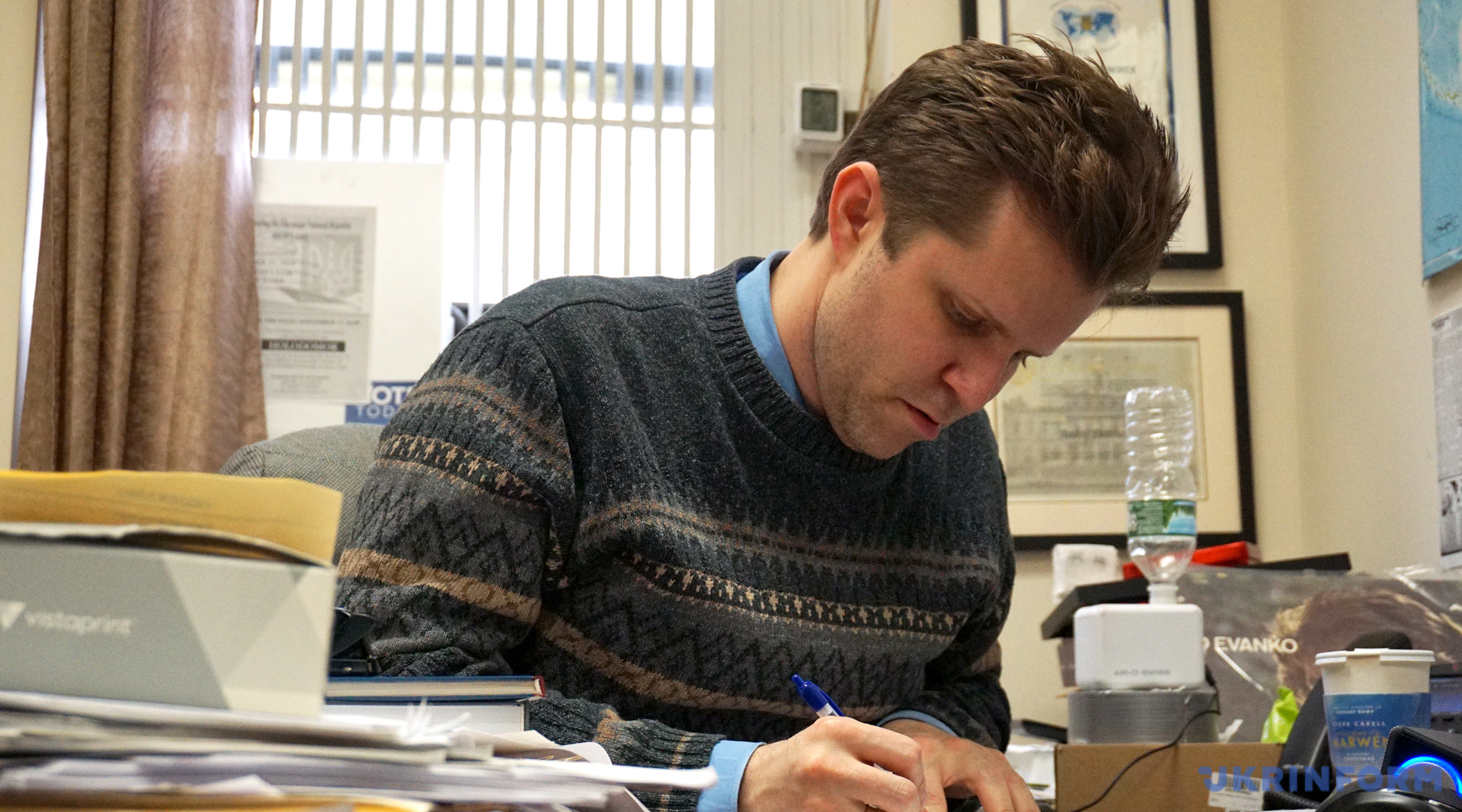
AMERICA, UKRAINE AND THE WORLD AFTER SENATOR MCCAIN
Q: Last year, Ukraine lost one great friend, Senator John McCain. Did you know him personally?
A: Yes, I did.
Q: How big is this loss for Ukraine and the United States?
A: This is a loss for the United States and for the whole world, for all those who believe in a strong America, which gives priority to its army, so that not only Ukraine and Europe, but the whole world, could have, for example, enough American ships, so that, among other things, China could not unilaterally prevent freedom of navigation, as Russia did near the Kerch Strait. The same can happen elsewhere in the world. I particularly worry that the past military budget may be the last of those we have seen over the past decade. I do not know who will take over McCain's role. We already know who will be the chair of the armed forces committee. But will there be a leader who will fight for America's support at a high military level?
We and our friends, Israel, Britain, in the opinion of Senator McCain, formed one joint system. I think that America should not give up such an approach, which some people may want.
Q: Instead, we see that the White House, on the contrary, seeks lesser involvement in world affairs. Do you think the military budget can be reduced in such circumstances?
A: The White House has not made any special changes to recent budgets that Senator McCain helped to create. Because he worked very closely with the Pentagon. We'll see what happens in the Pentagon under a new defense minister. This is another point in which we see changes. James Mattis personally visited Ukraine. We still do not know what happens under a new candidate proposed by President Trump. The Senate will have some questions to him since he has never held government positions and comes from the private sector.
American military have supported Ukraine for many years, both under Obama and Bush. They see that Ukraine is the center of Europe and it must be included in the world security system that will not work without Ukraine.
PREPARING FOR WAR AT SEA AND IN THE AIR
Q: Ukraine last year began to receive weapons from the United States. What do you make of the prospects for developing cooperation in the defense sector?
A: I think even those in America who want lesser U.S. involvement in wars in the world still understand the importance of arms sale. Ukraine must first have its own factories, and Ukrainians must produce everything they can on their own. It will promote the development of technologies and innovation. The military who took an active part in the fighting know better the needs of the Ukrainian army.
In my opinion, training is even more important than arms sale. This not only raises the level of the Ukrainian army, the National Guard, but also helps to achieve the level of NATO. It is very valuable that ordinary Americans, say, from Tennessee, visit, for example, Yavoriv. Military from Syracuse and Oklahoma last visited Ukraine. Ordinary American guys. They go, see Ukraine, fall in love with the country, people, land, culture. Some of them will later become representatives of the authorities, mayors, congresspeople. It is extremely important that Americans get acquainted with Ukrainians, fall in love with Ukraine, become loyal friends of ordinary Ukrainians. We'll see in 20, 30 or 50 years what comes out of it.
Q: Because the U.S. army is also a social lift to government positions?
A: Yes, of course.
Q: The United States already provides Ukraine with Javelin anti-tank missile systems and Island-class patrol boats. Are they talking about the expansion of cooperation, about the provision of more serious weapons?
A: At the end of February, in Washington, we will have another conference on Ukrainian-American military affairs with our member organization, the Center for U.S.-Ukrainian Relations. Last year, almost a year before the attack on Ukrainian ships in the Azov-Black Sea basin, we warned of a threat at sea. After all, Russia not only built the bridge, but already began to create obstacles to Ukrainian ships. This year I want to hear thoughts about what will happen in a year and later. The U.S. Air Force currently trains more and more Ukrainians. I think we have not seen the war in the air, but it's possible. Who could have thought that the war in Donbas and Crimea will spread to the sea?
America has a lot of old ships that they keep in reserve in the event of a big war. They also keep old planes and tanks, just in case.
We must pay special attention to the development of the Ukrainian fleet, as well as to the possibility of a war in the air. Will it be limited just to drones, or will Ukrainian aircraft really fight against Russian ones?
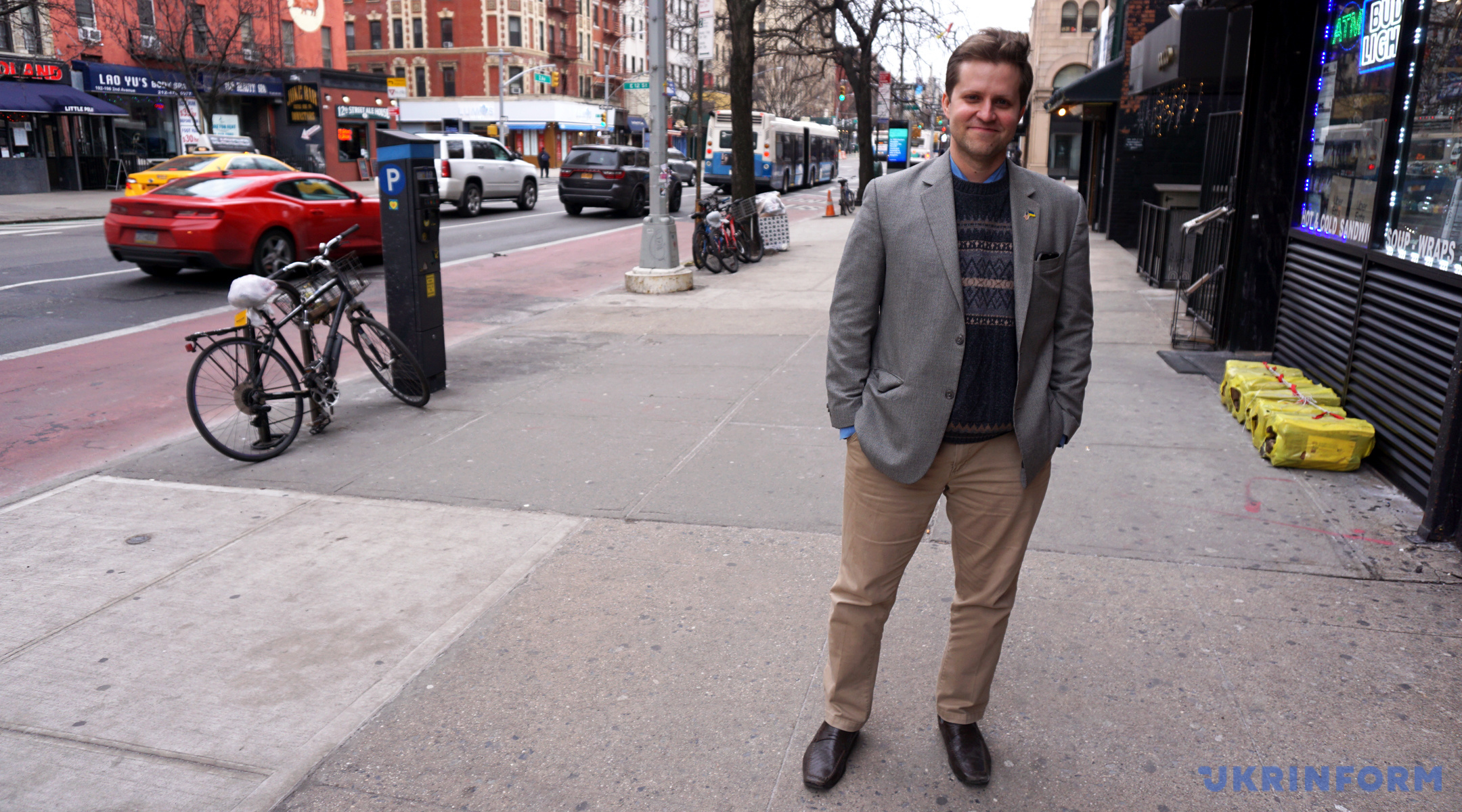
PUTIN'S MAIN GOAL IS TO SPLIT UKRAINIAN PEOPLE
Q: What goals does Russia pursue during the election campaign in Ukraine?
A: The most important thing is to divide the enemy. Putin's biggest strategic problem is that due to recent events he has united Ukraine, either activists against corruption, or ordinary military against military aggression. More and more Ukrainians see Russia as an enemy, not a close friend.
There will no longer be relations that once existed with Russia. Perhaps some clever conversations will return in two or three generations. Now Ukraine is united, and how can Putin split these people? With a military attack? Previous experience shows that it only unites Ukrainians. However, in order to intimidate people he will keep his opportunity, conducting military exercises or transferring troops to Belarus, producing new missiles.
At the same time, the most important thing for him is to divide the Ukrainian people. The easiest way to achieve this goal is during the election.
Q: It's clear, but what is the practical result that they aspire to? Disrupting these elections in principle? Provoking mass protests?
A: Undoubtedly, protests. Perhaps they want to strengthen some true fighters with corruption. For example, the GRU or the FSB will get some information on a certain candidate and pass it on to the Ukrainians. And they would have known about it, but would they know? They may spread some information that will not be false but aimed at dividing people. Unfortunately, Ukraine is still waiting for a peaceful, calm time when Ukrainians could work together for reforms and better bills.
There's the same polarization in America. The community was most united over the entire period [after the Revolution of Dignity in 2014]. However, when propaganda for Trump or Clinton started here, even in our community - this could be seen in social media - many Ukrainians in America were divided. And this happened despite the fact that everyone was united before. That is why I say that for our enemy the elections give an opportunity to divide Ukrainians and make them fight with each other.
In general, if Putin wants to continue to intervene in elections around the world, this year will be famous for him. This year will see elections in Ukraine, Israel, Canada, Poland, Slovakia, and elections to the European Parliament. He can choose where to meddle. It will be a very active year.
OBSERVERS TO BE WARY OF DURING THE ELECTION
Q: When we published your comment on 100-150 observers that the UCCA will send for the first round of the presidential election in Ukraine, many Russian propaganda media reprinted this news story with comments, saying "America will control Ukraine elections, everything solved," etc.
A: Yes, yes, yes! You see, what kind of control is enjoyed by a terrible Ukrainian diaspora! We are so effective! But I think you're a little familiar here with the community, and you see that it is very scattered, and we all work as volunteers in most cases. It would be fine if Mr. Soros gave us money! But that will never happen. Only Ukrainians have to support themselves. Here we are fighting for every penny.
Why are we organizing election monitoring? When I first arrived in Ukraine ten years ago, I traveled to 13 villages in one day. When I returned to the hotel, there were OSCE observers there. They sat until late at night and drank tea. They do not go everywhere, but travel only on central roads, staying mostly in hotels. It's like a holiday for them. When American Ukrainians come, they do not sit like on vacation. No one pays us. We come to do a special job, and we work until a polling station completes its work - until two, three or four o'clock in the morning.
Q: Many Ukrainian high-ranking officials said that Russian observers would not be allowed to work in the Ukrainian elections. Nevertheless, the OSCE still included two Russian women in the list. Do you agree with the ban for Russian citizens to participate in monitoring the Ukrainian elections, and what do you make of the OSCE decision?
A: I agree that such a ban should be in place during the war. Letting your enemy openly through the door so that they could have an opportunity to create a scandal?
Some OSCE members are real people. In fact, as in any international organization, there is the permanent influence of the enemy. We also see it in the UN.
HOW RUSSIA CORRUPTS THE WORLD ORDER
Q: An article on Russia's influence on international organizations and on how the Kremlin corrupts the world order has recently been published in the Wall Street Journal. Do you think this influence is growing stronger or weaker now?
A: It is strong now and will get even stronger. Unfortunately, when the Cold War ended, resistance got smaller and smaller, especially at the level of propaganda. Experts have been saying for the last five years: "Why America does not rebuild - not the Voice of America - but something new, some kind of information resistance?"
I'm sometimes shocked when I visit other countries. I was in England last year. They openly broadcast Russia Today at the cafe. Here in America you will not see that. The Ukrainian community in Argentina comes to us and says: "We cannot even get on television, Andrij. No one will listen to us. They all speak for Russia. Russia's influence means not only relations with official governments in the world. Russians also use all other possibilities. Business, for example. Or non-governmental organizations. You cannot imagine what influence they have, not only in the United Nations or in other countries.
If you looked at the list of non-governmental organizations registered with the UN, you would see how few Ukrainian organizations - and all other countries – are there, and how many Russians are there. When we come to the forum of indigenous peoples, we see how many indigenous peoples are there from Russia, and others. And they all come wearing St. George ribbons on clothes... Russia attacked you, so why do you glorify it?
Or how many of its agents Russia is sending to international organizations. I do not say that they are necessarily members of the GRU or the FSB, but, let's say, they have a "good relationship" with Russian leaders.
Q: You are often invited to represent the Ukrainian point of view on well-known international TV channels. What false ideas can be heard on the air?
A: The biggest stereotypes usually concern the fact that people simply know nothing about Ukraine. They could learn something about the Russian Empire or the Soviet Union. But, unfortunately, many people do not know about Ukraine. Some journalists who invite me to the television honestly admit: "I do not know anything about Ukraine, and I do not even know what to ask." When they ask, sometimes there is a strange situation, because they see the war in Ukraine from the point of view of equal "both sides." Most often you have to explain that Ukraine is a sovereign country, which was attacked by Russia that remains on its territory with tanks, missiles, etc. What is the equality of the sides here? You can not say to Ukraine: "What could you do to help Russia?" Well, to build a hotel, apparently (smiling - ed.). People really asked that question. As if the conflict began on both sides. The same war is not ongoing on Russian territory! End of story.
BREAKING OUT OF A CLOSED CIRCLE OF HISTORY
Q: In the history of Ukraine, there were already periods when, as a result of national liberation struggles, it broke out of the Kremlin's orbit. The latter was probably the period of 1917-1920. Unfortunately, they ended tragically, including by returning to the Russian zone of influence. Will not it happen now?
A: It can happen all the time. I constantly visit our community in America, and when I was recently preparing for the centenary of the creation of the Ukrainian People's Republic, I learned that at a time when Ukraine tried to become independent, it had very many votes in its support in America for four or five years in a row - I even read it in congressional newspapers. President Wilson himself had a separate "Day of Assistance to Ukraine" in 1917. All kinds of committees in support of the Baltic States, Poland, and Ukraine were created. There was such a united support group during that time. There was assistance for fur to five years. Everyone said they would support Ukraine. And it all disappeared.
Therefore, I remind people that then there were opportunities, but it disappeared all of a sudden. It was not just about the enemy. Yes, Soviet agents were not only in Ukraine, but all over the world. But American support disappeared suddenly.
Therefore, we cannot think that this military assistance that we provide to Ukraine more and more, from year to year, training, Island-class boats, will continue to happen by itself, without difficult, hard work.
All this can break down because the enemy never rests.
I explain to my wife why we are not going anywhere: "Mr. Putin does not rest, but I cannot rest too." Unfortunately, until peace returns to Ukraine, until the enemy leaves Ukraine, this work cannot stop. It is our duty to defend Ukraine.
I do not go with my eyes closed, thinking that this will never happen. I always worry that this can happen day after day. Nobody thought that Crimea would be occupied. I spoke at the State Department about the Budapest Memorandum for many years. They replied: "Andrij, this will never happen! Everything has been signed, and nothing will change." But the Russian attack occurred.
We have our own history here in the diaspora. We have been uniting for centuries here. Our ancestors came from the Ukrainian People's Republic, from the Ukrainian Insurgent Army, from the Sixtiers, from the later times when, by the 1980s, our leaders and activists came under attack. I have a very friendly relationship with Mustafa Dzhemilev, and I am happy that we have become close friends in recent years. We turn to them, asking how it all happened back then. So as to be ready now.
Heorhii Tykhyi, New York
